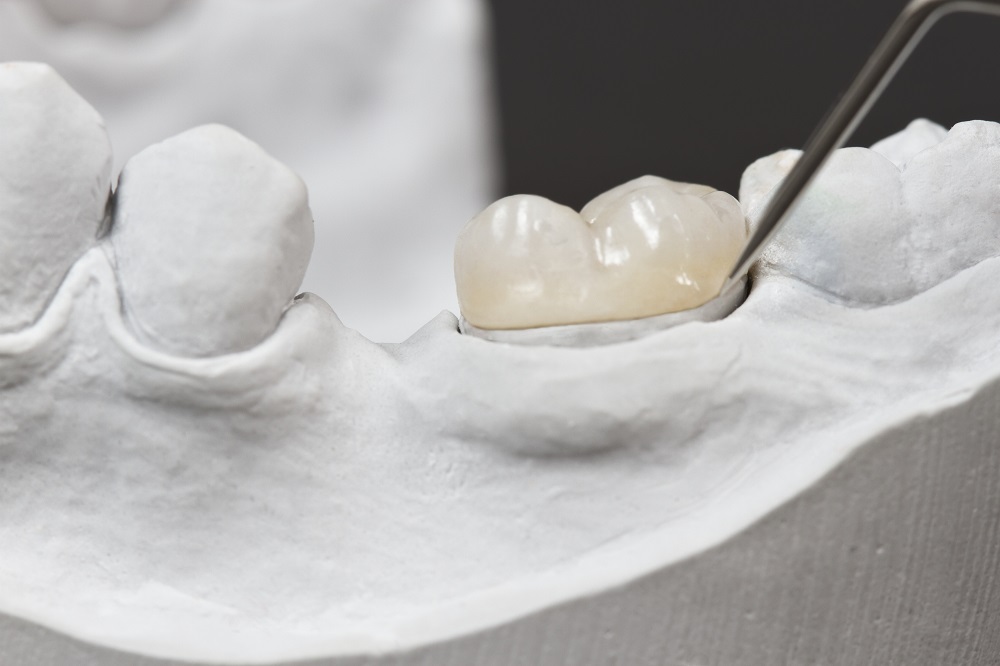Getting a dental crown near you is a flexible and efficient way to repair broken teeth, improve their aesthetics, and increase oral functionality. However, a crucial aspect of a successful treatment is ensuring the crown is fitted correctly. An incorrectly placed crown can lead to discomfort, difficulties, and future dental problems.
What are Dental Crowns?
The prosthetic restoration, or a dental crown, often called a dental cap or a tooth cap, covers a broken or compromised tooth to restore its size, shape, strength, and appearance. Crowns perform various dental functions and are custom-made by our dentist in Naples that mimic the shade and shape of your natural teeth.
Materials Used
- Porcelain or Ceramic: These materials closely resemble natural teeth and are frequently utilized for front teeth or teeth that require cosmetic repair.
- Metal Alloys: Materials such as gold, silver, or metal alloys are strong and durable, making them ideal for rear (back) teeth. While their colour does not resemble natural teeth, they are often considered for durability.
- Porcelain-Fused-to-Metal (PFM): These crowns blend metal’s strength with porcelain’s natural beauty. The metal structure offers stability, while the porcelain upper layer offers aesthetics.
- All-Ceramic or All-Porcelain: These crowns provide outstanding aesthetics without requiring a metal substructure. They are frequently utilized when both durability and cosmetic appeal are required.
Function and Purpose
- Restoration of Damaged Teeth – A crown can be put over a severely decaying, broken, or fractured tooth to safeguard and reinforce the remaining dental structure.
- Improvement of Tooth Appearance – Crowns can improve the appearance of cracked, discoloured, or excessively stained teeth.
- Replacement of Large Fillings – A crown may be required to provide better covering and support when a tooth is severely filled.
- Support for Weakened Teeth – Teeth with root canal treatment or big fillings may weaken with time. Crowns support the structure and prevent further damage.
- Anchor for Dental Bridges – Dental crowns can act as anchors for dental bridges, which replace lost teeth by connecting an artificial tooth (pontic) to two crown-capped adjacent teeth.
- Covering Dental Implants – Implants are often covered with crowns to provide a natural-looking and functional tooth replacement.
Signs of an Improperly Fitted Dental Crown
Discomfort and Sensitivity
Persistent soreness or sensitivity is one of the most typical signs of a poorly fitted dental crown. It can indicate that the crown is not positioned correctly if you feel discomfort when biting, chewing, or applying pressure to the tooth with a crown. A severe shooting pain around the crown may be a sign of discomfort.
Uneven Bite or Altered Occlusion
An incorrectly fitting crown might affect your teeth’s normal bite or occlusion by interfering with their natural alignment. It can indicate that your crown is not fitting properly if you notice changes in how your teeth come together when you close your mouth or have trouble chewing.
Gum Irritation and Inflammation
The gum tissues around a crown that doesn’t fit properly can become irritated and inflamed. It’s conceivable that the crown’s fit results in gum-related concerns if you notice redness, swelling, discomfort, or bleeding along the gumline of the crowned tooth.
Prolonged Discomfort After Placement
Although some soreness following a dental crown operation is normal, it should progressively disappear within a few days. It may indicate that the crown’s fit is improper if you feel ongoing discomfort or soreness that doesn’t go away with time.
Visible Gaps or Poor Aesthetics
The overall looks of your smile may be compromised by an incorrectly fitting crown that leaves apparent gaps between the crown and the natural tooth. The fit might not be ideal if there are apparent gaps or the crown doesn’t blend perfectly with the rest of your teeth.
Loose Crown
A crown is not correctly fitted if it feels loose or unsteady. A well-fitting crown has to be firmly affixed to the tooth’s supporting structure.
Why Proper Fit Matters?
For several reasons, ensuring that your dental crown fits properly is essential.
- Oral Health: An improperly placed crown may accumulate food particles and bacteria, leading to tooth decay, gum inflammation, and other health issues.
- Comfort: A well-fitting crown should feel at ease and regular in your mouth. Your ability to eat, speak, and enjoy daily activities might be hampered by discomfort or pain.
- Longevity: Crowns that are correctly fitted are more likely to last longer and prevent the need for early replacement.
- Aesthetics: A well-fitting crown improves your smile’s aesthetics, which adds to a smooth and natural appearance.
What to Do If You Suspect an Issue?
If you suspect an issue with your dental crown:
- Contact your dentist
- Schedule an appointment and get an examination and diagnostic evaluation.
- Adhere to your dentist’s recommendations for treatment.
- Seek temporary relief and adjustments if needed.
- If necessary, discuss options for a new crown.
- Continue good oral care around the crown.
- Attend any scheduled follow-up appointments.
Remember that promptly addressing any issues with your dental crown will help prevent future difficulties and assure your continuous oral health and comfort. Your dentist is essential in maintaining a healthy smile, so don’t be concerned about asking for their advice and expertise.
Book Your Next Visit!
At Torrens Dental, our dedicated team of skilled dentists near you is committed to providing comprehensive oral health solutions focusing on appearance and comfort. Our expert staff will provide individualized treatment tailored to your unique needs.
Elevate your smile’s health and beauty; call us today!

